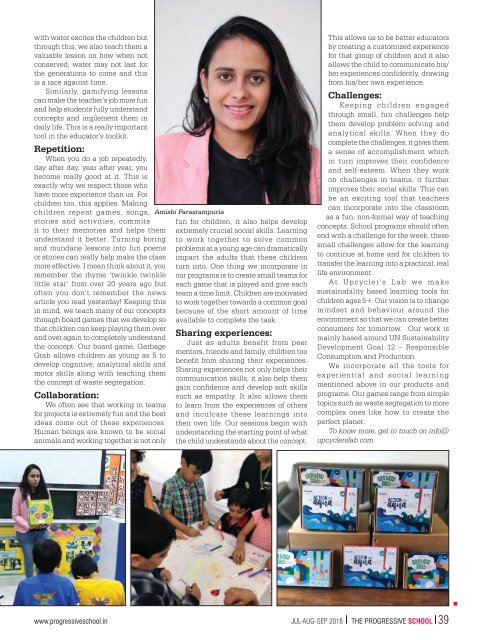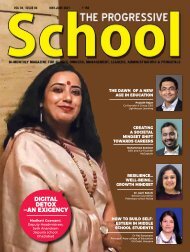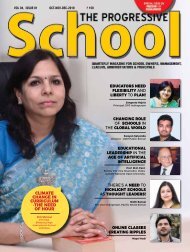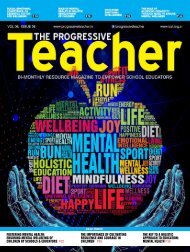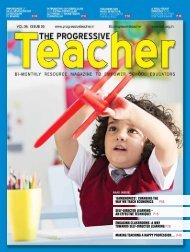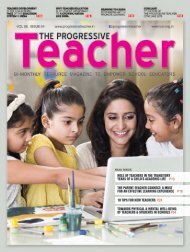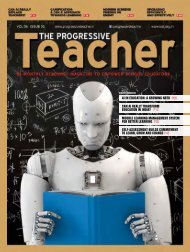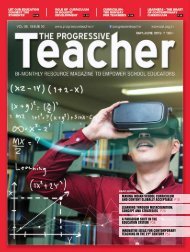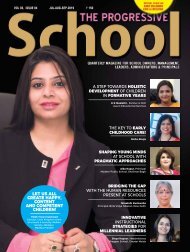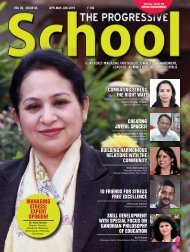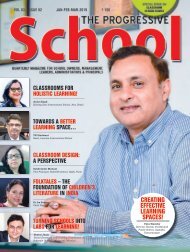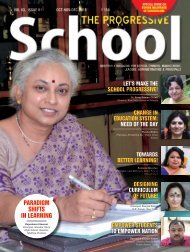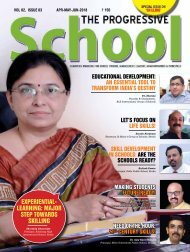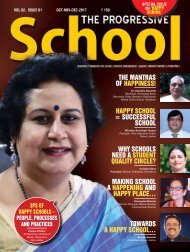The Progressive School Vol 02 Issue 04
The Progressive School is a quarterly magazine for school owners, leaders and principals. It will continue to address vital issues that impact the emerging challenges in the design, administration and growth of schools in all its dimension.
The Progressive School is a quarterly magazine for school owners, leaders and principals. It will continue to address vital issues that impact the emerging challenges in the design, administration and growth of schools in all its dimension.
Create successful ePaper yourself
Turn your PDF publications into a flip-book with our unique Google optimized e-Paper software.
with water excites the children but<br />
through this, we also teach them a<br />
valuable lesson on how when not<br />
conserved, water may not last for<br />
the generations to come and this<br />
is a race against time.<br />
Similarly, gamifying lessons<br />
can make the teacher’s job more fun<br />
and help students fully understand<br />
concepts and implement them in<br />
daily life. This is a really important<br />
tool in the educator’s toolkit.<br />
Repetition:<br />
When you do a job repeatedly,<br />
day after day, year after year, you<br />
become really good at it. This is<br />
exactly why we respect those who<br />
have more experience than us. For<br />
children too, this applies. Making<br />
children repeat games, songs,<br />
stories and activities, commits<br />
it to their memories and helps them<br />
understand it better. Turning boring<br />
and mundane lessons into fun poems<br />
or stories can really help make the class<br />
more effective. I mean think about it, you<br />
remember the rhyme ‘twinkle twinkle<br />
little star’ from over 20 years ago but<br />
often you don’t remember the news<br />
article you read yesterday! Keeping this<br />
in mind, we teach many of our concepts<br />
through board games that we develop so<br />
that children can keep playing them over<br />
and over again to completely understand<br />
the concept. Our board game, Garbage<br />
Grab allows children as young as 5 to<br />
develop cognitive, analytical skills and<br />
motor skills along with teaching them<br />
the concept of waste segregation.<br />
Collaboration:<br />
We often see that working in teams<br />
for projects is extremely fun and the best<br />
ideas come out of these experiences.<br />
Human beings are known to be social<br />
animals and working together is not only<br />
Amishi Parasrampuria<br />
fun for children, it also helps develop<br />
extremely crucial social skills. Learning<br />
to work together to solve common<br />
problems at a young age can dramatically<br />
impact the adults that these children<br />
turn into. One thing we incorporate in<br />
our programs is to create small teams for<br />
each game that is played and give each<br />
team a time limit. Children are motivated<br />
to work together towards a common goal<br />
because of the short amount of time<br />
available to complete the task.<br />
Sharing experiences:<br />
Just as adults benefit from peer<br />
mentors, friends and family, children too<br />
benefit from sharing their experiences.<br />
Sharing experiences not only helps their<br />
communication skills, it also help them<br />
gain confidence and develop soft skills<br />
such as empathy. It also allows them<br />
to learn from the experiences of others<br />
and inculcate these learnings into<br />
their own life. Our sessions begin with<br />
understanding the starting point of what<br />
the child understands about the concept.<br />
This allows us to be better educators<br />
by creating a customized experience<br />
for that group of children and it also<br />
allows the child to communicate his/<br />
her experiences confidently, drawing<br />
from his/her own experience.<br />
Challenges:<br />
Keeping children engaged<br />
through small, fun challenges help<br />
them develop problem solving and<br />
analytical skills. When they do<br />
complete the challenges, it gives them<br />
a sense of accomplishment which<br />
in turn improves their confidence<br />
and self-esteem. When they work<br />
on challenges in teams, it further<br />
improves their social skills. This can<br />
be an exciting tool that teachers<br />
can incorporate into the classroom<br />
as a fun, non-formal way of teaching<br />
concepts. <strong>School</strong> programs should often<br />
end with a challenge for the week, these<br />
small challenges allow for the learning<br />
to continue at home and for children to<br />
transfer the learning into a practical, real<br />
life environment.<br />
At Upcycler’s Lab we make<br />
sustainability based learning tools for<br />
children ages 5+. Our vision is to change<br />
mindset and behaviour around the<br />
environment so that we can create better<br />
consumers for tomorrow. Our work is<br />
mainly based around UN Sustainability<br />
Development Goal 12 – Responsible<br />
Consumption and Production.<br />
We incorporate all the tools for<br />
experiential and social learning<br />
mentioned above in our products and<br />
programs. Our games range from simple<br />
topics such as waste segregation to more<br />
complex ones like how to create the<br />
perfect planet.<br />
To know more, get in touch on info@<br />
upcyclerslab.com<br />
www.progressiveschool.in<br />
JUL-AUG-SEP 2018<br />
THE PROGRESSIVE SCHOOL<br />
39


